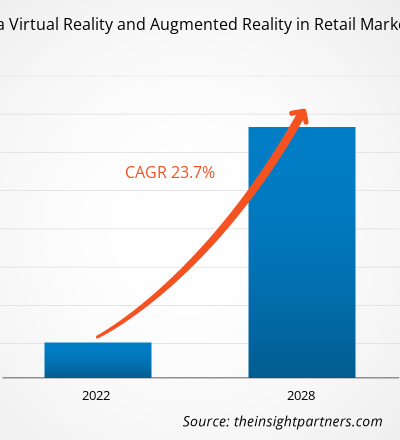The virtual reality and augmented reality in retail market in North America is expected to grow from US$ 1592.95 million in 2021 to US$ 7044.12 million by 2028; it is estimated to grow at a CAGR of 23.7% from 2021 to 2028.
The US, Canada, and Mexico are economies in North America. Customer support departments have improved considerably in recent years because of the potential of AI-powered chatbots and virtual assistants. On the other hand, virtual reality (VR) in customer service is proving to be a game-changer for retailers in terms of consumer engagement and happiness. Chatbots struggle with remote troubleshooting, which is a difficult component of customer care to get correctly. However, when both sides can perceive what the other is seeing and feeling, even basic and difficult issues can be resolved in less time. There is no better way for businesses to demonstrate how much they respect their customers than by implementing great customer service initiatives, and virtual reality is the most advanced type of technology that is assisting the retail industry in doing so. Virtual reality creates a totally immersive experience with a powerful sensory effect and a strong emotional connection with users. Businesses are making use of this connection to engage with customers in new and relevant ways. Customers are more likely to make repeat purchases and become lifelong brand loyalists when they are emotionally connected with a brand. Customers can have an immersive purchasing experience that makes them feel as if they are physically and emotionally engaged with a brand. Furthermore, virtual reality provides consumers with a highly realistic level of experience. To display items in new ways, marketers can create a variety of exciting, exhilarating, scary, and even emotional VR ads.
With the COVID-19 pandemic spreading across the US, all industries have been severely impacted. As a result, any impact on industry has a direct impact on the region's economic growth. The unusual spike in COVID-19 cases in the US, as well as the accompanying lockdown to battle the virus's spread across the country in the first two quarters of 2020, has prompted many businesses to prepare for the worst. In 2020, technological investments experienced a dip, owing to the above-mentioned reasons. However, the retail industry has been adopting technologies such as virtual reality and augmented reality much before the pandemic. According to IBM's 2020 US Retail Index report, the pandemic has expedited the shift to digital purchasing by about five years. Virtual "try-before-you-buy" experiences ranging from previewing furniture and products in your house with daily brands like IKEA and Home Depot to digitally trying on luxury fashion brands like Louis Vuitton and Gucci have been on the increase. Similarly, GLAMlab's Ulta's virtual try-on beauty tool, which was established four years ago, has seen an increase in utilization during the pandemic. In addition, when jewelry manufacturer Kendra Scott's stores were temporarily closed, the company implemented an augmented reality application that let buyers to visually try on numerous earring styles from the comfort of their own homes. Thus, rise in adoption of AR by customers and increase in investment in the technology by retailers during the pandemic have positively impacted the growth of the North America Virtual Reality and Augmented Reality in Retail market across the region.
With the new features and technologies, vendors can attract new customers and expand their footprints in emerging markets. This factor is likely to drive the North America virtual reality and augmented reality in retail market. The North America virtual reality and augmented reality in retail market is expected to grow at a good CAGR during the forecast period.
- This FREE sample will include data analysis, ranging from market trends to estimates and forecasts.
North America Virtual Reality and Augmented Reality in Retail Market Segmentation
North America Virtual Reality and Augmented Reality in Retail Market – By Type
- AR
- VR
North America Virtual Reality and Augmented Reality in Retail Market- By Application
- Online Retail
- Offline Retail
North America Virtual Reality and Augmented Reality in Retail Market - By Country
- US
- Canada
- Mexico
North America Virtual Reality and Augmented Reality in Retail Market -Companies Mentioned
- Epson America, Inc.
- Google LLC
- Infosys Ltd.
- Intel Corporation
- Marxent
- Microsoft Corporation
- PTC Inc.
- Qualcomm Technologies, Inc.
- Samsung Electronics Co., Ltd.
North America Virtual Reality and Augmented Reality in Retail Report Scope
| Report Attribute | Details |
|---|---|
| Market size in 2021 | US$ 1592.95 Million |
| Market Size by 2028 | US$ 7044.12 Million |
| Global CAGR (2021 - 2028) | 23.7% |
| Historical Data | 2019-2020 |
| Forecast period | 2022-2028 |
| Segments Covered |
By Type
|
| Regions and Countries Covered | North America
|
| Market leaders and key company profiles |
- Historical Analysis (2 Years), Base Year, Forecast (7 Years) with CAGR
- PEST and SWOT Analysis
- Market Size Value / Volume - Global, Regional, Country
- Industry and Competitive Landscape
- Excel Dataset

Report Coverage
Revenue forecast, Company Analysis, Industry landscape, Growth factors, and Trends

Segment Covered
Type and Application

Regional Scope
North America, Europe, Asia Pacific, Middle East & Africa, South & Central America

Country Scope
US, Canada
Trends and growth analysis reports related to Electronics and Semiconductor : READ MORE..
- Epson America, Inc.
- Google LLC
- Infosys Ltd.
- Intel Corporation
- Marxent
- Microsoft Corporation
- PTC Inc.
- Qualcomm Technologies, Inc.
- Samsung Electronics Co., Ltd.



 Get Free Sample For
Get Free Sample For